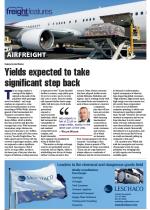The air cargo market is coming off the highs it enjoyed at the peak of the pandemic when passenger travel was halted – and cargo markets are expected to come under increased pressure in 2023, according to Willie Walsh, director-general of the International Air Transport Association (Iata). “Revenues are expected to be $149.4 billion, which is $52bn less than 2022 but still $48.6bn stronger than 2019. With economic uncertainty, cargo volumes are expected to decrease to 57.7 million tonnes, from a peak of 65.6m tonnes in 2021,” he told Freight News. “A s belly capacity grows in line with the recovery in passenger markets, yields are expected to take a significant step back. Iata expects a fall of 22.6% in cargo yields, mostly in the latter part of the year when the impact of inf lation-cooling measures is expected to bite.” To put the yield decline in context, cargo yields grew by 52.5% in 2020, 24.2% in 2021 and 7.2% in 2022. Even the sizable and expected decline leaves cargo yields well above pre-Covid levels. Africa was particularly exposed to macroeconomic headwinds, which had increased the vulnerability of several economies and rendered connectivity more complex, said Kamil Alawadhi, Iata’s regional vice president for Africa & Middle East.“The strains on foreign exchange reserves are particularly acute in countries such as Nigeria, which is withholding over $551m of foreign airlines’ revenue earned in that country. Other African countries that have adopted similar tactics include Ethiopia, Zimbabwe and Algeria. Iata is working closely with the central banks and treasuries in each of those countries to construct a repayment plan that will not leave any carriers out of pocket, while ensuring international connectivity is maintained for trade, commerce and tourism, all of which are lucrative forex revenue generators for those countries.” According to Glyn Hughes, director general of The International Air Cargo Association (Tiaca), the air cargo industry is always subject to a multitude of inf luences and the current downturn in demand is unfortunately a logical consequence of what has been impacting global consumers. “High inf lation, high interest rates, high energy costs and concern over job security have compounded to create an air of defensive consumer spending, in which case discretionary spending is pulled back,” he said. “However, the current situation is temporary and we can hope that later in 2023 central banks will start reducing interest rates when inf lation is considered to be under control. Structurally the industry is in a good place, and towards the second half of 2023 we could see demand picking up compared to this year.” On a positive note, Walsh said with the resumption and recovery of passenger travel, the cargo pendulum was swinging back as belly capacity was becoming available again.

